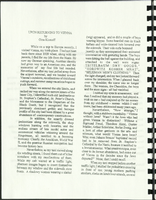Search the Special Collections and Archives Portal
Search Results
Pearson Urban, Ruth, 1948-
Ruth Urban was born November 16, 1948 in Los Angeles, California. At the age of ten, she moved to Las Vegas, Nevada with her mother and older sister. Urban spent most of her childhood in the Huntridge area and was always involved with Temple Beth Sholom. After graduating from Las Vegas High School, Urban attended the University of Nevada, Las Vegas where she received a bachelor’s degree in social work, and later, a master’s degree in counseling.
Person
Mack, Joyce, 1925-2024
Joyce Mack was a community leader, volunteer, and philanthropist in Las Vegas, Nevada who supported UNLV since its founding. Born Joyce Rosenberg on August 17, 1925 in Los Angeles, California, she later attended the University of California, Los Angeles, where she met her husband Jerome D. "Jerry" Mack. The couple married in 1946 and moved to Las Vegas, Nevada in 1947.
Person
National Organization for Women, Las Vegas Chapter Records
Identifier
Abstract
The National Organization for Women, Las Vegas Chapter Records document the philosophy, activities, and politics of the National Organization for Women (NOW) from 1966 to 2009 with most materials covering the period of 1971 to 1974. The records demonstrate the activities and political positions of NOW and they include correspondence, policies, memoranda, files, publications, and ephemera from the Las Vegas, Nevada chapter.
Archival Collection

Compilation of writings from the Holocaust Survivors' Group, circa 1998
Date
Archival Collection
Description
Bound compilation of four issues of the Holocaust Survivors' Group essays and poems.
Text

Transcript of interview with Charles W. Hunsberger by Stefani Evans and Claytee White, July 27, 2016
Date
Archival Collection
Description
It seems counterintuitive that a man who was raised a Mennonite, spoke Pennsylvania Dutch before he spoke English, and was destined to quit school after eighth grade to work on the family farm would grow up to become one of the most progressive and visionary library directors in the United States. His participation in the Building Las Vegas project results from his being responsible for building twenty libraries in Clark County during his 1971–1994 tenure as director of the Las Vegas-Clark County Library District. One of his first controversies was to insist on going to high school after his father demanded he quit. After graduating high school he went to Nigeria on behalf of his church, serving there for five years. Upon returning to the U.S., he found work at the Fort Wayne Library, albeit he was limited by how far he could advance because of his limited education. After attaining his library degree Indiana University at Bloomington he served as director at the Columbia City Library
Text

Steve Jones and Bart Jones interview, Novermber 7, 2016: transcript
Date
Archival Collection
Description
Brothers Steve and Bart Jones live and breathe Las Vegas history. Their grandparents, Burley and Arlie Jones, arrived in Las Vegas in the nineteen-teens; their father, Herb Jones; his sister, Florence Lee Jones Cahlan, and their uncle, Cliff Jones, helped form the legal, journalistic, and water policy framework that sustains Southern Nevada today. The Jones brothers build on that foundation through their custom home-building company, Merlin Construction. In this interview, they talk about living and growing up in Las Vegas, of attending John S. Park Elementary School, of hunting in the desert, of their family's commitment to cultural and racial diversity, and of accompanying their grandfather to his business at the Ranch Market in the Westside. They share their early work experiences lifeguarding and later, dealing, at local casinos as well as second-hand memories of the Kefauver trials through the tales told by their father and uncle. Steve describes mentor Audie Coker; he explains
Text

Jocelyn Cortez interview, March 18, 2019: transcript
Date
Archival Collection
Description
Interviewed by Nathalie Martinez. Jocelyn Cortez is a Salvadoran-American immigration lawyer. She grew up on the Eastside of Las Vegas and grew up going to school in the Clark County School District and at UNLV before going to Law School at the University of Arizona. She is an engaged community member as an immigration lawyer working alongside the Culinary Union and the Latino Bar Association.
Text

Transcript of interview with Walter Weiss by Claytee White, November 2, 2010
Date
Archival Collection
Description
In this interview, Walter Weiss discusses how Judaism and boxing kept him out of trouble in his youth. Weiss grew up in the Boston area, and started boxing as a teenager. Weiss talks about his boxing training, becoming a runner for a bookmaker, and coming to Las Vegas in the 1950s to be a bookmaker for the Stardust Hotel, and working the slot machine floor. He had several different jobs in various casinos, and discusses different people involved in the gaming industry in Las Vegas.
Walter Weiss life story begins in a Malden, Massachusetts during the Great Depression. His early background was a blend of observant Judaism, secularism, and the effects of the era. He was a troubled youth whose older brother encouraged him to join him in boxing. As Walter explains: I was a wild kid and ... boxing saved my life. His aptitude for boxing led him to be a sparring partner in New York City's famous Spillman Gym. There he met and worked out with some of the greatest fighters of the era, including Rocky Marciano. He recalls how he turned professional while attending the University of Miami and how he first came to Las Vegas in 1958 to escape his personal troubles and find work with a local bookmaker. Thus began his diverse employment history in the casino industry. He details his various positions and the cast of famous and infamous characters of the times. For six years he return to New York and worked as a Wall Street broker before arriving back in Las Vegas in 1973. He talks about his property ownership, lobbying for an amendment to Senate Bill 208, his personal religious changes and a sundry of observations about the changes that occurred as the state took over gaming.
Text

Transcript of interview with Jonathan Sparer by Stefani Evans and Claytee White, August 29, 2016
Date
Archival Collection
Description
Text
